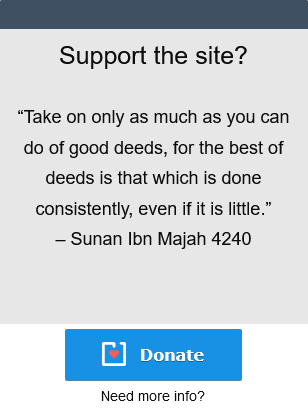The second-shortest Sura, with only 3 ayat (verses), gives us much to think about: time, eternity, and how we spend our time in this world. It’s been said that the sahaba (followers) of Prophet Mohammad used to recite this Sura whenever they departed, and this Sura is considered of great importance, perhaps surprising for such a small Sura. But it poses an important question. Shall we invest our limited time and resources towards this world or the next? And what does it actually mean to “invest towards the next” life?
The title of this Sura has been also translated as “the declining day” (because one of the prayer times, the afternoon, is usually referred to as al-‘asr) or ”epoch,” as a large increment of time. The Sura itself is below:
The title of this Sura has been also translated as “the declining day” (because one of the prayer times, the afternoon, is usually referred to as al-‘asr) or ”epoch,” as a large increment of time. The Sura itself is below:
وَٱلۡعَصۡرِ
By time,
Al-‘Asr 103:1
إِنَّ ٱلۡإِنسَٰنَ لَفِى خُسۡرٍ
Indeed, mankind is in loss,
Al-‘Asr 103:2
إِلَّا ٱلَّذِينَ ءَامَنُواْ وَعَمِلُواْ ٱلصَّٰلِحَٰتِ وَتَوَاصَوۡاْ بِٱلۡحَقِّ وَتَوَاصَوۡاْ بِٱلصَّبۡرِ
Except for those who have believed and done righteous deeds and advised each other to truth and advised each other to patience.
Al-‘Asr 103:3
Interpretation of the Meaning
By Time ( Allah swears by Time) – time is the element having a beginning and an end, specifically applicable to ‘asr, whether defined as “day’s end” or “epoch,”or “time” in general, it connotes a limited period, and this is the defining element of human life in this world. Death is our fate, written and irrevocable. It underscores and determines our reality. But then, so does birth.
Humanity is in loss – since we must die, and our term is limited, whatever we put into this life will be taken away, hence “in loss.”
Except those who believe/trust/have faith in Allah/God and do righteous deeds (charitable acts, working for justice, acts of kindness, being honest witnesses/ give true testimony, avoiding immorality and oppression and deception), and advise one another to Truth (to not deny what is true and not deceive ourselves or others) and advise one another to be patient. This also underscores the importance of patience in a time-based world where our time is intertwined with that of others, making the system of limitations and opportunities more complex.
The final longest aya makes an exception to being in loss under 4 conditions:
Trust in God. He knows everything and all He does is for the greatest Good but we cannot know or therefore properly judge such what is out of our sphere of knowing and experience. So we have to trust these realities.
Give generously, be kind and considerate of others, avoid oppression and immoral acts (taking interest/usury, sexual promiscuity or rape, stealing except for food in dire need, murder [killing except “with right” ie in self-defense, war in defense against aggressors, or by law after fair trial], deceitful or unfair business practices, gaining political power by force or deception, tyranny or abuse of any kind of power whether personal or social), give honest testimony except under duress without remedy, and do not abuse animals or earth’s resources.
Advise others to truth: to be truthful but also to not deny truth
Advise others to be patient
From this, we can understand what it means to invest towards the next life, the Hereafter: by meeting the above conditions. All these are in fact simply ethical deeds, exemplary behavior. We then ”invest” our resources towards the next life by simply being good people in this one. When Allah the Exalted mentioned prophet Mohammad (pbuh) in 68:4 ”Indeed you are of a great moral character,” where the word khluluq also means ”good manners” or exemplary behavior (here modified by ’atheem or ”great”), this was also to let us understand the huge importance of basic human decency and good manners. An excellent description of such manners in the context of human spiritual developmen




